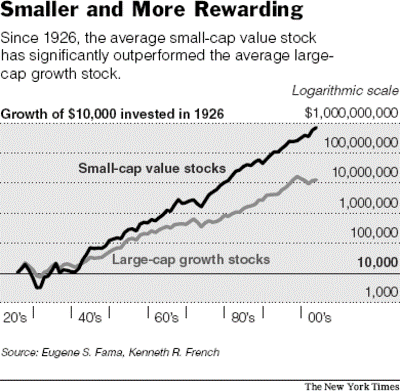When Things Don’t Go as Planned
Back in 1992, Eugene Fama and Kenneth French published research finding that over longer time frames, value stocks tended to outperform growth stocks and small cap stocks tended to outperform large.
And for a while the research held up.
When Fama won the Nobel Prize in 2013, he was applauded by articles like this one, titled, Small-cap value stocks winning, as Nobel laureate Fama predicted, which cited charts like the one below showing that from 1926 to 2011, small-cap value stocks returned 13.9% while large-cap growth stocks returned 8.7%.
But then things changed. As Howard Marks wrote in the Most Important Thing Illuminated:
Cycles are self-correcting, and their reversal is not necessarily dependent on exogenous events. They reverse (rather than going on forever) because trends create the reasons for their own reversal. Thus, I like to say success carries within itself the seeds of failure, and failure the seeds of success.
It is therefore no surprise that when we look at the below chart from JP Morgan’s most recent Guide to the Markets, the worst performing style box over the last 10 years has been small cap value. The best performer? Large cap growth. The exact opposite of what Fama’s research predicted.
Just as trees do not grow to the sky, the best performers of this decade are unlikely be the best performers in the next. Success carries within itself the seeds of failure, and failure the seeds of success. What has been working for investors today, will not work the same forever into the future.
To repeat what I said in the note, Is International Exposure Still Useful, true diversification inside a portfolio always means we will be apologizing for something. When US markets are up, we will regret owning international. When large cap is up, we will regret owning small cap. When growth is up, we will regret owning value. But owning things that mute volatility in both directions is what risk management, and successful long-term investing, is all about.





When it comes to writing about investments, the disclaimers are important. Past performance is not indicative of future returns, my opinions are not necessarily those of TSA Wealth Management and this is not intended to be personalized legal, accounting, or tax advice etc.
For additional disclaimers associated with TSA Wealth Management please visit https://tsawm.com/disclosure or find TSA Wealth Management's Form CRS at https://adviserinfo.sec.gov/firm/summary/323123